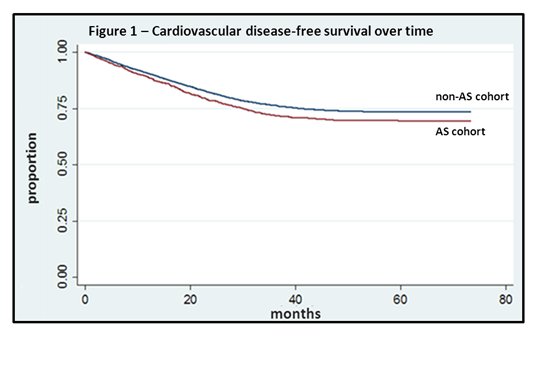Session Information
Session Type: Abstract Submissions (ACR)
Background/Purpose:
Cardiovascular disease (CVD) risk is well established in rheumatoid arthritis but less so in ankylosing spondylitis (AS). Due to a similar inflammatory profile, AS patients may be expected to be at increased risk of CVD, particularly ischemic heart disease, hyperlipidaemia and hypertension. Thus, the aim of this study was to determine whether there is an increased risk of CVD among persons with AS.
Methods:
Design: matched cohort study. The Scottish Primary Care Clinical Informatics Unit collects demographic, diagnostic and clinical information from a nationally representative sample of general practices in Scotland, UK. As almost all UK residents are registered with a general practitioner and referrals to specialist services are made via this route, the database provides a source of nationwide health data. In April 2007, the database consisted of 3,256,108 patients, approximately 60% of the Scottish population. The ‘exposed’ cohort comprised all patients with a prior clinical diagnosis of AS (indicated by disease-specific codes). These patients were matched at a ratio of 4:1 to non-AS patients by age (+/- 1yr), gender and area-level deprivation. AS patients were followed up from date of diagnosis until either a CVD diagnosis or the end of follow-up period. Non-AS patients were assigned the same index date as their matched exposed patient and followed to the same end point. All those with a CVD diagnosis prior to the index date were excluded. Data was extracted on the following CVD outcomes: ischemic heart disease; congestive heart failure; cerebrovascular disease; cardiomyopathy; pericarditis; valvular disease; conduction disturbances; hyperlipidaemia; hypertension; atherosclerosis; and heart valve replacement. Differences in the occurrence of CVD between cohorts were examined using (a) Kaplan-Meier survival curves, and (b) Cox proportional hazards regression. Results were adjusted for smoking status and summarised as hazard ratios (HR).
Results:
1,964 AS patients, plus 7,856 matched non-AS patients, were identified (mean age 62yrs, 77% male). Median follow-up time was 16yrs (IQR 8-26). The risk of CVD, over time, is shown in Figure 1. Persons with AS were significantly more likely to receive a diagnosis of CVD than individuals without AS (HR 1.15; 95%CI 1.05-1.26) and, in particular, experienced a 20% increase in the risk of hypertension (1.20; 1.07-1.34). No significant individual associations were found with any of the other CVD diagnoses under investigation, including ischemic heart disease, heart failure or hyperlipidemia.
Conclusion:
This large nationwide primary care cohort demonstrates an increased risk of CVD among AS patients which is evident from the time of diagnosis. Clinicians should be aware of the excess CVD risk in this patient group which may help inform their overall management, with the view to optimize long-term quality of life.
Disclosure:
L. E. Dean,
None;
G. J. Macfarlane,
Abbott Laboratories,
2,
Pfizer Inc,
2;
A. G. MacDonald,
None;
G. T. Jones,
Abbott Laboratories,
2,
Pfizer Inc,
2.
« Back to 2013 ACR/ARHP Annual Meeting
ACR Meeting Abstracts - https://acrabstracts.org/abstract/ankylosing-spondylitis-is-associated-with-an-increased-likelihood-of-cardiovascular-disease-a-nationwide-matched-cohort-study-in-primary-care/

